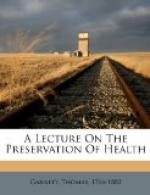Besides the effects of the air, we ought by no means to be indifferent with regard to what we take into the stomach as food and drink; since these have even a greater influence on our health, than the circumstances I have already mentioned. Among the causes which excite the body, and support life, I have formerly mentioned food, or the matters taken into the stomach. It is from these matters that all the animal solids and fluids are formed; these are stimuli, which if totally withdrawn, we could not exist many days. These stimuli are subject to the same laws with all the others which act upon the body. When they act properly in concert with the other powers, they produce the healthy state; but if they act in an undue degree, whether that action be too great or too little, disease will be the consequence. When they act too feebly, the excitability will accumulate; and diseases of debility, attended with a very great degree of irritability, will take place: this has been instanced in those who have been without food for some time. Persons who have been shut up in a coal-work by the falling-in of the pit, and have consequently been without food for some days, have had their excitability so much accumulated, as to be intoxicated with a bason of broth.
To this source we may attribute many of the diseases with which the poor are afflicted; but they are by no means so common as diseases of an opposite nature, which arise from a too free use of food. I shall confine myself here to the consideration of what is more strictly called food, and afterwards consider the effects of strong liquors.
When we take food in too great quantity, or of too nourishing a quality, it will either produce inflammatory diseases, such as pleurisy; or by exhausting the excitability, it will bring on stomach complaints, gout, and all the symptoms of premature old age. This follows so evidently from the laws we have investigated, that it is scarcely necessary to say more on the subject; and I am sure there are few who have not seen examples of it.
Be therefore temperate in eating, and eat only of such foods as are the plainest; and let a proper quantity of vegetable food be mixed with animal. If you value the preservation of health, never satiate yourselves with eating; but let it be a rule from which you ought never to depart, always to rise from table with some remains of appetite: for, when the stomach is loaded with more food than it can easily digest, a crude and unassimilated chyle is taken into the blood, pregnant with diseases. Nor is the quantity the only object of attention; the quality of the food is to be carefully studied; made dishes, enriched with hot sauces, stimulate infinitely more than plain food, and therefore exhaust the excitability, bringing on diseases of indirect debility; such as the worst kind of gout, apoplexy, and paralytic complaints. “For my part,” says an elegant writer, “when I behold a fashionable table set out in all its magnificence, I fancy that I see gouts and dropsies, fevers and lethargies, with other innumerable distempers, lying in ambuscade among the dishes.” Let it be therefore laid down as a rule by those who wish to preserve their health, and I have nothing to say to those who are indifferent on that head, to make their chief repast on one plain dish, and trifle with the rest.




